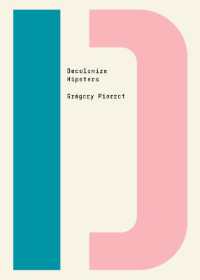Full Description
The Routledge Handbook of Heritage Language Education provides the rapidly growing and globalizing field of heritage language (HL) education with a cohesive overview of HL programs and practices relating to language maintenance and development, setting the stage for future work in the field. Driving this effort is the belief that if research and pedagogical advances in the HL field are to have the greatest impact, HL programs need to become firmly rooted in educational systems. Against a background of cultural and linguistic diversity that characterizes the twenty-first century, the volume outlines key issues in the design and implementation of HL programs across a range of educational sectors, institutional settings, sociolinguistic conditions, and geographical locations, specifically: North and Latin America, Europe, Israel, Australia, New Zealand, Japan, and Cambodia. All levels of schooling are included as the teaching of the following languages are discussed: Albanian, Arabic, Armenian (Eastern and Western), Bengali, Brazilian Portuguese, Chinese, Czech, French, Hindi-Urdu, Japanese, Khmer, Korean, Pasifika languages, Persian, Russian, Spanish, Turkish, Vietnamese, and Yiddish. These discussions contribute to the development and establishment of HL instructional paradigms through the experiences of "actors on the ground" as they respond to local conditions, instantiate current research and pedagogical findings, and seek solutions that are workable from an organizational standpoint. The Routledge Handbook of Heritage Language Education is an ideal resource for researchers and graduate students interested in heritage language education at home or abroad.
Contents
Introduction
Maria M. Carreira, Claire Hitchins Chik and Olga E. Kagan
Part I. A Landscape of Heritage/Community Languages: Demographic Surveys
The Constellation of Languages in Europe: Comparative Perspectives on Regional Minority and Immigrant Minority Languages
Guus Extra
Migration, Heritage Languages, and Changing Demographics in Australia
Finex Ndhlovu and Louisa Willoughby
The Demographics of Heritage and Community Languages in the United States
Terrence G. Wiley and Shereen Bhalla
Demographics and Heritage Languages in Latin America - An Overview
André Zampaulo
Demographics and Heritage Languages in Canada: Policies, Patterns, and Prospects
Patricia A. Duff and Ava Becker-Zayas
Part II. Community Initiatives: After-School Programs
Crisis, Change, and Institutionalization: Adopting a New Curriculum at a Japanese Weekend School
Robert M. Uriu and Masako O. Douglas
Sustainable Approaches to Complementary Education in England
Raymonde Sneddon
Innovations in the Teaching of Portuguese as a Heritage Language: The Case of Brazilian Complementary Schools in London and Barcelona
Ana Souza and Juliana Gomes
Czech Heritage Language Education in Communities in the United States and Europe
Marta McCabe
The Role of Informal Heritage Language Learning in Program Building: Persian Community School Language Learners in Australia
Mojgan Mokhatebi Ardakani and Robyn Moloney
Part III. Community Initiatives: All-day Pre-, Primary, and Secondary Schools
Opportunities and Challenges of Institutionalizing a Pluricentric Diasporic Language: The Case of Armenian in Los Angeles
Shushan Karapetian
Education in the Cambodian Chinese Diaspora
Dana Bourgerie
Innovation vs. Tradition in Language Education: A Case of Japanese Heritage Language Instruction in Chile
Saeid Atoofi and Francisco Naranjo Escobar
Rationalization of the First Language First Model of Bilingual Development and Education: The case of Russian as a Heritage Language in Israel
Mila Schwartz
Part IV. Language Minority Communities and the Public School System: Opportunities and Challenges
Multilingual Los Angeles: Do Immigrant Language Communities Make an Impact on Language Education in Public High Schools?
Olga E. Kagan
Overcoming the Obstacles: Vietnamese and Khmer Heritage Programs in California
Claire Hitchins Chik and Wayne Wright
Institutionalization of French Heritage Language Education in U.S. School Systems: The French Heritage Language Program
Fabrice Jaumont, Benoît Le Dévédec, and Jane F. Ross
Engagement, Multiliteracies, and Identify: Developing Pedagogies for Heritage/Community Language Learners within the UK School System
Jim Anderson
Part V. Maintenance of Heritage/Community Languages in Public Schools: The Impact of Government Policy and Sociopolitical Change
Reforming Australian Policy for Chinese, Indonesian, Japanese, and Korean Heritage Languages: Examples from the Japanese Community
Kaya Oriyama
Russian as a Heritage Language in Lithuania
Meilute Ramoniene, Ala Lichaciova, and Jelena Brazauskiene
Pasifika Heritage Language Education in New Zealand
Corinne Seals
Heritage Language Education in Norway and Sweden
Sunil Loona and Mats Wennerholm
"The Right to Mother-Tongue Education for Migrants in the City": Factors Influencing the Institutionalization of a Two-Way Bilingual Immersion Program in Berlin
Gabriela Meier and Birgit Schumacher
Part VI. Heritage/Community Languages in Higher Education
The State of Institutionalization of Heritage Languages in Post-secondary Language Departments in the United States
Maria M. Carreira
"Arabic-as-resource" or "Arabic-as-problem"? Arab Heritage Language Learners in Danish Post-Secondary Education
Helle Lykke Nielsen
Implementation and Institutionalization of Spanish Heritage Language Programs at Two Regional Comprehensive Universities in the United States
Alegría Ribadeneira and Alejandro Lee
The Hindi-Urdu Heritage Language Stream: Institutional and Pedagogical Challenges
Shobna Nijhawan
Part VII. Heritage/Community Language Maintenance from a Lifespan Perspective: Formal and Informal Contexts
Chinese Heritage Language Learning: Negotiating Identities, Ideologies, and Institutionalization
Patricia A. Duff, Yongcan Liu, and Duanduan Li
Classroom and Community Support for Turkish in Germany
Carol W. Pfaff, Meral Dollnick, and Annette Herkenrath
Korean Language Education in Japan: From Marginalized Heritage Language to Popular Foreign Language
Robert J. Fouser
Innovation and Tradition in Yiddish Educational Programs
Netta Avineri and Anna Verschik








